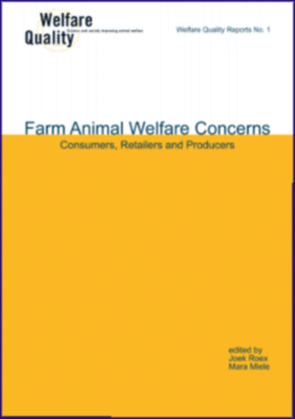



Consumer’ concerns about animal welfare when shopping vary widely between European countries
EU - Considerable attention is being given to what consumers can do to improve farm animal welfare. Linking improvements of farm animal welfare to what people do as food consumers is essential to realise better animal welfare in Europe. This recent study shows that such linkages vary considerably across Europe. |
Across Europe, a large majority of consumers say that farm animal welfare is important. This ranged from 69% of respondents in the Netherlands, 73% in the UK, 75% in France to 83% in Hungary and Sweden. Norway and Italy scored the highest, with 84% and 87% respectively.
There is still concern among consumers, first of all related to conditions in poultry production, but also to conditions of pigs. Compared to these, people tend to see the treatment of dairy cows as least worrisome. People are concerned about conditions on the farm; transportation and slaughtering are also met with concern.
Public opinions differ considerably across the seven countries. Italian and French respondents are quite worried about welfare conditions in their own country; concerns are often associated with food purchasing, and trust in actors in the food sector is relatively low. Hungarians do worry about the issue and they are also more pessimistic about current trends, but animal welfare is of less relevance when shopping.
The Dutch display lower general interest, but many worry. Many do think of welfare conditions when shopping for eggs and beef. Trust in actors is high. The British show similar patterns, but trust in authorities, market actors and organisations is much lower.
Finally, the Swedes and the Norwegians are engaged with the issue; they are trusting and not worried. Particularly in Norway, animal welfare is rarely associated with the consumer role.
When asked about changes over the last ten years, there is considerable optimism in most countries. A majority of consumers thinks that conditions for farm animals have improved, while less than one in five think that the situation has become worse.
This optimism may be one of many reasons why the researchers found that the proportions of people who associate animal welfare concerns and worries with their own purchasing practices are much lower than the general interest and concern. They may simply not see the need for action.
Still quite a few consumers do think about such issues when shopping for eggs, beef or milk. These proportions are generally much higher than the market shares for special animal-friendly products. This indicates a wider consumer definition of food animal welfare than product labels offer. In understanding this, we must also consider the products that are on offer in the food markets across Europe and how they are labelled. Later studies in Welfare Quality® will investigate such topics.
The results of the survey are presented in more detail in a Welfare Quality® report, published by Cardiff University (available in March 2007). The study was conducted among 10,500 consumers, The findings are based on representative samples in France, Hungary, Italy, United Kingdom, the Netherlands, Norway, and Sweden. The study was conducted by Unni Kjærnes of the National Institute for Consumer Research, Oslo and seven other European research institutes/universities: Ashtown Food Research Centre - Ireland, Cardiff University - United Kingdom, Stockholm University - Sweden, University of Pisa - Italy, University of Reading - United Kingdom, Université de Toulouse le Mirail - France, Wageningen University and Research Centre, The Netherlands.
Earlier studies have indicated that animal welfare can be of considerable concern among consumers when buying food. Population surveys conducted as part of the Welfare Quality project explore in more detail the extent of social engagement in farm animal welfare issues and how this engagement is reflected in everyday consumption practices across Europe.








